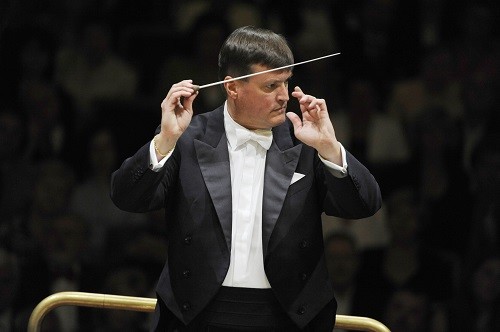 Switzerland Weber, Liszt, Brahms: Denis Matsuev (piano), Sächsische Staatskapelle Dresden / Christian Thielemann (conductor), Kultur- und Kongresszentrum Lucerne, 31.5.2018. (JR)
Switzerland Weber, Liszt, Brahms: Denis Matsuev (piano), Sächsische Staatskapelle Dresden / Christian Thielemann (conductor), Kultur- und Kongresszentrum Lucerne, 31.5.2018. (JR)

Weber – Oberon Overture
Liszt – Piano Concerto No.2
Brahms – Symphony No.4
This was old-school playing and conducting of the finest order; established conservatism at its best. The concert format was traditional, an overture, a concerto, a symphony (for review in Dresden click here). Nothing remotely modern in terms of music or attire. A conductor wearing tails, holding in the palm of his hand – very deftly – a long baton. Orchestra members with very shiny shoes. It was as though time had stood still.
Thielemann talks fondly of Furtwängler and Karajan (his former mentor) and it is very clear that both have influenced his interpretations, style and even demeanour on stage. Whilst he smiles occasionally, it is clear he is very much in command, and his orchestra members obey. What results is music-making of the highest quality, even if the occasional interpretative aspect or practice may not now be considered up-to-date.
We started off with Weber’s overture to his opera Oberon, an absolute joy from its first note to the last – the fairies were dancing. I had a smile on my face throughout. The orchestra members enjoyed it visibly too. The woodwind were witty, and needless to say accomplished, there was delicacy and, when required, thrust. You could hear the forerunner of Wagner and Brahms at work, and this was clearly music tailormade for Thielemann. Weber, incidentally, was at the helm of the Dresden Opera from 1817. Oberon however was written for initial performance in London, where he died after a strenuous string of rehearsals.
Liszt’s piano concertos are not concertos as we normally know them. His second is in the style of a symphonic poem, one long movement with six sections interspersed with very short piano interludes. His second concerto is less showy than his first and slightly less popular. Denis Matsuev, a great bear of a man, can be a barnstormer but also showed that he can play with great delicacy, even though he then looks as though he in pain. Thielemann whipped up the orchestra into a brass frenzy at appropriate moments, the solo cello passages were sublime, but I was left with a feeling that the work had failed to satisfy or convince. I think that is a fault of the work, of the composer (his writing for piano far surpassing that for orchestra), and not in any way the performers.
Thielemann expertly crafted the Brahms symphony from the opening bars. The first movement was simply phenomenal; the superb acoustics of the KKL certainly helped. The sound was full and mellow, the violinists employing a great deal of vibrato, the whole horn section never putting a foot wrong. (Brahms was a horn player, although he also played the double bass, which might explain his favour of passages for horn.)
The second movement brought respite from the energy of the first; the third movement was suitably joyous, meticulous and fleet of foot. I especially liked the timpanist using hard sticks. The final movement gave some principals a chance to shine, highlighting the commendable clarinet, oboe, flute and trombones.
This was a performance that brought to mind Karajan’s performances of yesteryear; polished, taut, faultless. The interpretation also brought Furtwängler to mind due to the frequent use of rubato, which occasionally, especially in the central section of the final movement, stemmed the flow of the music. ‘Have his batteries run out?’ I scribbled in my programme at one stage.
We were then served a generous overture: Weber’s melodious overture to Euryanthe, which once again confirmed Thielemann’s credentials in this composer’s music. Thielemann already has the air of someone who is going to be in charge of the venerable orchestra for a very long time to come. For the quality of its music-making alone, this concert is sure to be a highlight of my musical year.
John Rhodes
